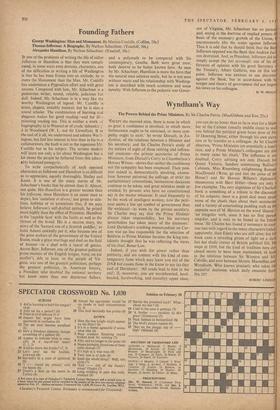Wyndham's Way
The Powers Behind the Prime Ministers. By Sir Charles Petrie. (MacGibbon and Kee, 21s.) `EXCEPT the married state, there is none in which so great a confidence is involved, in which more. forbearance ought to be exercised, or more sym- pathy ought to exist.' So wrote Disraeli, in En- dymion, of the relations between, a Minister and his secretary; and Sir. Charles Petrie's study of the careers of eight of these retiring and influen- tial creatures—the private secretaries of Prime Ministers, from Disraeli's Corry to Chamberlain's Horace Wilson—shows that neither the confidence nor the sympathy has been misplaced. Their posi- tion indeed is, democratically speaking; anoma- lous; however universal the suffrage, or strict the parliamentary conventions, momentous decisions continue to be taken, and great mistakes made or avoided, by persons who have no constitutional say in the matter whatever. It used frequently to be the work of intelligent women; now the petti- coat seems a less apt symbol of government than the waistcoat—as worn by the private secretary. Sir Charles may say that the Prime Minister always takes responsibility, but his secretary nevertheless has taken many of the decisions: Lord Davidson's crushing memorandum on Cur- zon was no less responsible for the selection of Baldwin as Prime Minister because the King mis- takenly thought that he was reflecting the views of his chief, Bonar Law.
Indeed, if you wish for power rather than publicity, and are content with the kind of con- temporary fame which may leave you out of the DNB but causes those in the know to say (as they said of Davidson): 'All roads lead to him in the end'; if, moreover, you are warmhearted, level- headed, hardworking, and (usually) upper class, you can do no better than to lie in wait for a Mc ber of the Cabinet (usually middle class) to wa you behind the political green baize door of No 10 Downing Street, either through his own-eleva tion or by transfer to a colleague. As Sir Charlei observes, 'Prime Ministers are essentially a lonel race, and a Prime Minister's colleagues are als in many cases his rivals.' The influence is un. doubted; Corry advising not only Disraeli bull Queen Victoria, Sandars summoning. Balfour'( Cabinets, Miss Rosenberg enlightening RamsaY MacDonald (`Rose, go and feel the pulse of the House') and Sir Horace Wilson's diplomatic manoeuvres with Herr Hitler—these are only few examples. The very slightness of Sir Charles's book is something of a tribute to the discretion of his subjects; there is a good deal more about some of the chiefs than about their secretaries, and a variety of entertaining padding such as the apposite mot of M. Herriot on the word 'disarm': 'an irregular verb, since it has no first person singular, and is only to be found in the future tense.' Sir Charles has found it necessary to exec' cise tact with regard to the many characters (other, apparently, than Eden) who are still alive; but hit book casts a revealing gleam of light on a dark but not shady corner of British political life. He stops at 1939, but the kind of tradition here dis. closed seems to have been maintained, at least, in the relations between Sir Winston and Mr. Colville, and now between Messrs. Macmillan and Wyndham. Who knows precisely who takes the masterful decisions which daily emanate front No. 10?






































 Previous page
Previous page